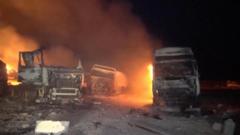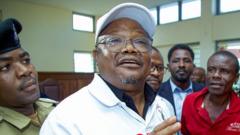Saudi Arabia and Qatar's financial pledge could revive international support for Syria's new government as the nation grapples with extensive economic devastation.
# Saudi Arabia and Qatar Step In to Aid Syrian Reconstruction

# Saudi Arabia and Qatar Step In to Aid Syrian Reconstruction
Saudi Arabia and Qatar agree to settle Syria's $15 million World Bank debt to aid recovery efforts post-civil war.
In a significant development for post-war Syria, Saudi Arabia and Qatar have confirmed their commitment to pay off Syria’s $15 million debt to the World Bank. This collaborative effort is seen as a pivotal step toward revitalizing Syria’s economy, battered by years of civil conflict. The payment is expected to lift a 14-year ban on World Bank operations in the country, allowing access to critical funds and technical resources for governmental rebuilding initiatives.
The Syrian administration has conveyed its "deep gratitude" for this financial assistance, highlighting its potential to foster cooperation with international bodies aimed at economic recovery and reconstruction. Despite this progress, the nation faces considerable challenges in its restoration efforts, especially following the ousting of Bashar al-Assad in December, which came after nearly 14 years of ongoing war.
Currently, over 90 percent of the Syrian populace lives in poverty, with one in four individuals out of work, according to United Nations estimates. The Syrian pound’s value has plummeted since the war, shifting from an exchange rate of 50 Syrian pounds per US dollar to roughly 15,000 pounds in the aftermath of the regime's change.
Though there were initial optimistic expectations for an immediate lifting of Western sanctions targeting the Assad regime, reality has fallen short. While some European Union countries and Britain have slightly eased restrictions, the United States has issued a six-month general license permitting specific exemptions from its sanctions. The new governance, led by rebel factions following the regime's collapse, continues to complicate the economic landscape, enforcing measures that leave the local population further struggling. Long queues at banks for cash withdrawals and the dismissal of numerous civil servants highlight ongoing financial turmoil.




















